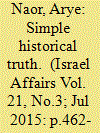|
|
|
Sort Order |
|
|
|
Items / Page
|
|
|
|
|
|
|
| Srl | Item |
| 1 |
ID:
141903


|
|
|
|
|
| Summary/Abstract |
In 1966 the UN passed two International Human Rights Covenants that are among the great achievements of humankind. The covenants were adopted in five equally binding languages, one of which was Chinese. The People's Republic of China (PRC) is generally assumed to have ratified one and signed (but not ratified) the other. In 1973, however, soon after the PRC began representing China in the UN, new Chinese-language versions of each mysteriously came into existence. These are the versions one is likely to find on the UN website, and they are what the Chinese government treats as the “covenants.” The authors of this article show that these contain substantial revisions from the covenants that had been passed by the UN 1966 and subsequently ratified by at least 164 countries. The revised versions are so different, in fact, that one could well question whether the PRC actually embraced either covenant. The covenants granted rights that the revisions would later withdraw, and in at least one case the revisions recognize a right that is absent in the covenants. Based on their comparative analysis of the various versions, the question arises as to whether China is a responsible actor in the international legal order and a reliable partner when it comes to entering into agreements with other countries or acceding to international treaties. Given that China comprises over one-fifth of humanity, it also brings into question whether the principles in the covenants can claim absolute validity and anything like universal acceptance.
|
|
|
|
|
|
|
|
|
|
|
|
|
|
|
|
| 2 |
ID:
191000


|
|
|
|
|
| Summary/Abstract |
An internationally renowned scholar and theologian, Rabbi Lord Jonathan Sacks (1948–2020), longstanding Chief Rabbi of the United Hebrew Congregations of the Commonwealth (1991–2013), suggested a direct discussion of the State of Israel. By way of exploring the way he viewed the modern State of Israel, this article discusses Rabbi Sacks’ overall communitarian, covenant based ideas before focusing on three categories: national narrative, the invigoration of civil society, and the place of religion. His most distinct criticism relates to the interrelationship between religion, the political system, and the state, illustrated inter alia by his insistence that ‘Judaism must be depoliticised and put back where it belongs, in civil society, far removed from all structures of power’.
|
|
|
|
|
|
|
|
|
|
|
|
|
|
|
|
| 3 |
ID:
139248


|
|
|
|
|
| Summary/Abstract |
Begin's ideology with regard to Judea, Samaria and Gaza was based on historical, theological and security related grounds, leading him to conclude that the Jewish people have an eternal, sacred right to the land. This was the basis for his settlement policy as prime minister and for the Palestinian autonomy proposal he made – both meant to prevent a division of the Land of Israel.
|
|
|
|
|
|
|
|
|
|
|
|
|
|
|
|
|
|
|
|
|